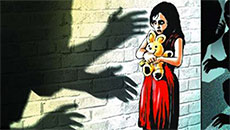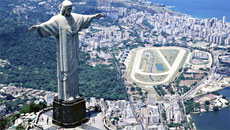As Pakistani authorities are all set to raze a 79-year-old temple in Rawalpindi, anger and disappointment prevail among the country's Hindu minority that is seeking protection and freedom to practise their religion in an Islamic state.
Hindus have been living in Rawalpindi for over a century and the 1935-built Maharishi Valmik Swamiji Mandir in the Gracy Lines area of the Chaklala cantonment holds major significance as it enables them to worship and conduct religious festivities. Its entrance is decorated with Pakistani flags, a sign of the Hindu minorities' patriotism and love for the country where they were born and grew up.
When notice to demolish such an old temple was issued July 18, a sense of anger, fear, and panic gripped not just the over 20,000 Hindus of Rawalpindi and neighbouring Islamabad but also the two million Hindus - a dwindling community - living across Pakistan, a nation of 180 million people.
The temple is to be razed to make way for an educational and housing complex. Officials have assured the Hindus they would build a new temple wherever the residents were relocated, "even if it costs Rs.2 million, a Dawn report said recently.
Fearing that they might lose the temple as well as their homes, the area's Hindus filed a petition with the civil court and were granted a stay order till Aug 21. But the order provides them temporary relief as they can live in the area only until Sep 13.
"The mandir is considered to be the home of the lord. Every human has an emotional attachment to his religious places. Valuing such feelings, it shouldn't be demolished," a Hindu college student in Rawalpindi, who did not wish to be identified for fear of retaliation, told IANS in an e-mail communication.
A Lahore-based Hindu intellectual, requesting similar anonymity, contended the Valmik temple is the Hindus' sacred place and used for religious practices. "The temple should be respected like any other religious community's sacred place is. Everyone should be free to perform their religious practices in their sacred places."

As many Hindus expressed inability to speak to the media for security concerns, some Muslim intellectuals spoke up on their behalf.
Lahore-based journalist Raza Wazir felt the demolition of the temple symbolizes "a trend in Pakistan where the space for religious plurality and tolerance of different beliefs is fast shrinking".
It is indicative of a change in the attitude of the authorities as well as the active members of society who "no longer consider it their duty to care for faiths other than Islam", Wazir told IANS in an email, adding: "This is surely a bad sign for the progress of Pakistan's democratic culture."
"Unless and until Pakistan treats its minorities at par with its Muslim citizens it cannot hope to be at peace with itself and its neighbours," Wazir said.
At the time of partition of the Indian subcontinent in 1947, many of Rawalpindi's Hindus had opted to put up at their roots due to emotional bonding instead of migrating to India.
"They are today concerned as, despite their loyalty shown to the country, they are not being accepted like other citizens. Hindus are worried about the existing state of affairs as they feel unsafe despite being granted citizens' rights under the Pakistani constitution like others," Muhammad Akbar Notezai, a Pakistan-based journalist, told IANS in an e-mail interview.
The temple has been providing a shelter to homeless Hindus and is a "symbol of unity" of Hindus living there. Demolishing it means "bringing an end to their unity as well and compounding the woes of the already persecuted homeless Hindus," Notezai said.
He said the Hindus already face insecurity, kidnapping for ransom and forced conversions of their daughters in Pakistan. If they were relocated, their woes would compound since non-Hindus were already the least tolerant towards them.
"We must not forget the temple in Rawalpindi has been providing a shelter to homeless Hindus and has been a sign of unity for Hindus living here...demolishing it means ending their unity as well and compounding the woes of the already persecuted homeless Hindus."
Article 25 (1) of the Pakistani constitution says all citizens are equal before law and are entitled to equal protection of law. "Like Muslims, Hindus are also equal citizens of Pakistan, and their lives, sacred places and property must also be protected," Notezai added.





